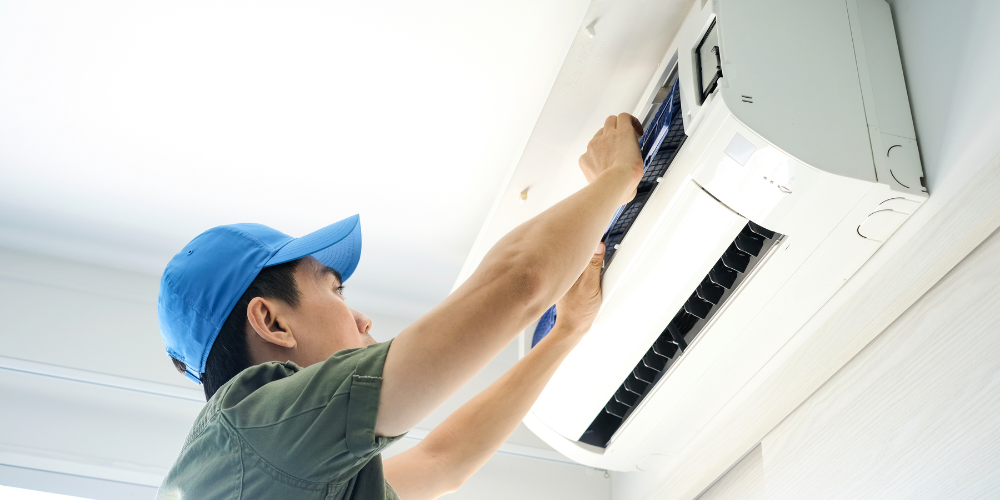
It’s very hot inside and your air conditioner stops working. Gone through it so many times, right?
Air conditioners are essential for comfort, especially during extreme summers. But, like any appliance, they can encounter issues that disrupt their performances. Although some minor issues can be resolved with simple troubleshooting, many require professional air conditioner repair to ensure safety efficiency.
Therefore, we have outlined some of the common AC problems to help you identify when to call for repairs and when you might manage a fix yourself.
Common Air Conditioning Problems
- Bad Capacitor
If your thermostat is working and air is blowing from your vents but is not cold, the issue could be a bad capacitor in your AC’s outside unit. Capacitors provide an energy boost to help the electric motors start and run efficiently. Over time, they weaken and may eventually fail, which causes the fan or compressor to stop working.
A buzzing or humming sound from the unit without any movement is a common sign. Ignoring a blown capacitor can lead to further damage inside the system. In such cases, prompt AC repair is essential to replace the capacitor and restore functionality.
- Refrigerant Leaks
Low refrigerant levels in your air conditioner are often caused by leaks or undercharging during installation. If leaks are the issue, simply adding refrigerant will not resolve the problem. A trained technician should locate and fix the leak, test the repair, and recharge the system with the exact refrigerant amount specified by the manufacturer.
Proper refrigerant levels ensure optimal performance and efficiency, thereby avoiding undercharging or overcharging issues. Moreover, refrigerant leaks can harm the environment and make timely air conditioner repair crucial. Always address such problems promptly to maintain your AC’s functionality and reduce its environmental impact.
- Drainage Problems
As your AC cools your home, it also dehumidifies the air by removing moisture. This moisture is drained outside through a PVC drain line. Over time, algae and debris can clog the drain line, which causes water to back up into the unit.
A secondary drain pan and an “SS2” safety switch are designed to prevent damage by shutting off the system when water overflows. If your thermostat goes blank or the condensing unit stops, it may indicate drainage issues.
Although you can try cleaning the drain yourself, professional AC repair is often needed to ensure proper drainage and system safety.
- Failing Blower Motor
The blower motor in your AC is responsible for circulating air through your home and ductwork. While generally reliable, blower motors are among the top components that require repairs. They often operate in hot or humid environments and may not receive proper maintenance, like lubricating bearings or cleaning out debris.
Additionally, as the motor’s capacitors age, they can place extra strain on the motor during startup. If you notice an electrical burning smell or hear grinding or banging sounds, it is likely from the blower. To prevent further damage or potential fire hazards, turn off the system and call for air conditioner repair immediately.
- Bad Odor
A bad, damp odor coming from your AC is often a sign of dirty air filters or coils. You can clean the filters yourself, but coil cleaning requires specialized tools or professional help. Fungi or algae growth can also cause unpleasant smells.
Another concerning odor is that of refrigerant, which has a distinctive sweet or ether-like scent. If you detect this, it is a sign of a refrigerant leak, and immediate professional attention is required. In both cases, calling for AC repair is essential to restore clean air and prevent further damage to your system.
- Bad Condenser Fan Motor or Compressor
A faulty condenser fan motor or compressor is a common issue that often requires air conditioner repair. Both components are located in the outside condensing unit of your HVAC system. If you notice that the system is not running, hear unusual screeching or grinding sounds, or experience a tripped breaker, one of these parts may be to blame.
The most common failures include shorted or open windings, which prevent the motor from functioning properly, or damaged bearings and valves, which can cause screeching noises or refrigerant leaks. Since these issues are complex, it is best to call a professional for repair.
Conclusion
These are some of the most common AC problems you may encounter; chances are, you have experienced a few. While some issues are simple fixes, others require the expertise of a qualified technician for proper AC repair. Regular maintenance ensures your air conditioner runs smoothly, especially during peak usage in hot summers.
To avoid a breakdown at the most inconvenient time, make it a habit to service your air conditioner regularly or even consider an annual maintenance contract (AMC). Contact us to keep your system in top condition: 956-702-4377.












